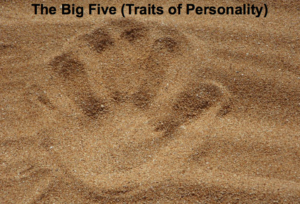
In Dr. Leonard Sax’s new book, The Collapse of Parenting: How we hurt our kids when we treat them like grown-ups, he discusses many important points.
One central point is that we have become so focussed on our children’s achievements, accomplishments, or preparing them for “success”, that we have let the development of character and virtues take a “back-seat”.
In his book, he discusses “The Big 5” – the five personality traits which have now come to be widely accepted by the field of psychology, as the five continuums of our personality. Of these five personality traits, there is one which Dr. Sax highlights as being especially important and most predictable of happiness, wealth and life satisfaction.
What Are the “Big Five”?
(We can remember them with the acronym, O.C.E.A.N)
#1 Openness
- An openness to experience. The high end of this continuum would have people who are more creative, imaginative, open to a variety of experiences, prefer novelty and curious at the high end, and people who are more consistent, perseverant, pragmatic, evidence driven and cautious at the lower end. (As with the nine traits of temperament, both ends of the continuum have advantages and disadvantages.)
#2 Conscientiousness
- At the high end, conscientiousness would constitute a tendency to be organized, reliable, self-disciplined, goal-oriented, principled, and a preference for planning. On the low end, one would be more flexible and spontaneous, less reliable and less attention to details.
#3 Extroversion
- At the high end, one would be a typical extravert: social, seeking stimulation by being around others, talkative, energetic, positive and assertive. At the other end of the continuum, which we would call Introversion, one would be more reflective, reserved, more of an internal processor and would refuel by having some quiet, down-time.
#4 Agreeableness
- To be high in agreeableness, one would tend to very trusting, helpful, friendly, compassionate and cooperative. Whereas, some who was lower on the agreeableness continuum would be more detached, analytical, challenging, competitive and suspicious.
#5 Neuroticism
- To be high in neuroticism one would experience negative emotions more easily such as anger, anxiety, and depression. This person would have less emotional stability and could be more sensitive and nervous. On the low end of neuroticism, one would be confident, secure and have more emotional stability and better impulse control.
(For further reading refer to: The Big Five Theory of Personality. Handbook of Personality: Theory and Research, 3rd edition. (NY: Guilford Press, 2008, edited by Oliver John)
Which of the Big 5 Predicts More Happiness, Wealth and Life Satisfaction?
The answer: Conscientiousness
In, The Collapse of Parenting, Dr. Sax states that individuals who are higher in conscientiousness…
- earn and save more
- are significantly happier
- are substantially more satisfied in their lives
- have better health and longer lives
- are less likely to become obese
- are less likely to develop Alzheimer’s
- are less likely to use drugs and alcohol and
- are less likely to engage in risky sexual behaviours
Dr. Sax describes honesty, integrity and self-control (impulse control) as qualities within conscientiousness that are not innate – we have to teach them to our children. We also have to model them!
If we become so focussed on getting our children into the “right school”, the “right post-secondary program”, the performance level fine arts, varsity sports teams, or on appearance and popularity, we will have done them a tremendous disservice. These external factors will not develop their internal, moral character. We need to support our children in developing, what Dr. Sax calls, their “truest self”.
I will be talking more about the development of character, resilience and respect, in my upcoming webinar and I really hope you’ll join me.
Warmly,

PS. Today is the last Sunday to watch the three part video series! The videos will be coming down this Friday, December 2nd, 2016. They are approximately 15-20 minutes each in length so even busy parents can find time to watch them! You can access them directly here. Video #1: How to Handle Our Kids’ BIG Emotions! Video #2: 5 Common Parenting Myths Debunked! “We don’t know what we don’t know…” Video #3: 7 Tips to Avoid and Minimize Power Struggles.
PPS. Enrolment in my 30 day program (10 minutes/day) for developing a solid parenting framework with a step-by-step blueprint, which covers the most common parenting challenges, is closing this Friday, December 2nd, 2016 at midnight. To find out more information and to enrol, click here: The Toddler to Teen™ Parenting Solutions Foundational Course
PPPS. Registration is open for my next round of “Brain Science” groups – Understanding Anxiety and Anxiety Management Strategies starting in January 2017. These groups are for boys and girls ages 7-9 yrs. and 10-12 yrs. Please click here to see more information and to register. (*The 7-9 year old group only has 2 spaces left!)
Want to Connect?
Subscribe now to receive free weekly parenting tips and inspiration.






